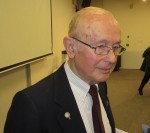On Nov. 18, Robbie Waisman spoke at the Jewish Museum and Archives of British Columbia. (photo by Pat Johnson)
The head of Canada’s Truth and Reconciliation Commission is crediting Robbie Waisman, a Vancouver man and a child survivor of Buchenwald concentration camp, with making a significant impact on the work of the landmark national initiative.
Justice Murray Sinclair, the first Aboriginal judge appointed to the Provincial Court of Manitoba, headed the commission that handed down its report earlier this year. It is a compendious study of the legacy of Indian residential schools in Canada, with recommendations for redress. Over the course of a century, an estimated 30% of Aboriginal children in Canada were taken from their family homes and placed in residential schools. Funded by the federal government and run by Christian churches, the schools forbade children from speaking their native languages. Countless numbers were physically and sexually abused, even murdered, starved to death or died from lack of medical attention. Of the estimated 150,000 children who went through the system, 4,000 are believed to have died. Survivors have struggled for decades with the legacies of the experience. The Truth and Reconciliation Commission (TRC) was the first comprehensive nationwide effort to address the history.
Sinclair told the Independent that Waisman made a crucial suggestion that informed the work of the commission. It can be extremely difficult for survivors to tell their stories directly to their children, Waisman told Sinclair. He himself did not tell his own children about his experiences in the Holocaust; they learned some of the details by witnessing their father tell his history to others. The commission took this advice to heart, said Sinclair.
“Based on that, when we go to a community, we bring all the [residential school] survivors in and we always make a point to bring their children in so that when the survivors are talking to us, the children are hearing them,” Sinclair said. “That proved to be an exceptionally strong piece of advice for us to open the lines of communication within families. From the perspective of residential school survivors, often the most important process of reconciliation that they wanted to engage in, that they needed to engage in, was to apologize to their own families for how they behaved after residential schools and to be given an act of forgiveness by their children, their spouses, their family members.”
Waisman participated in the entire TRC process, traveling to every part of Canada to speak with residential school survivors about his own story of survival and about creating a life after experiencing the most unimaginable horrors.
“I told them that I am one of the 426 teenagers that was liberated at Buchenwald,” Waisman explained. “We couldn’t go home, we went to France and, in France, the experts that analyzed us told the French government that these kids, first of all, won’t amount to anything because they’ve seen too much and they’ll never rehabilitate. Get a Jewish organization to look after them, they told the French government. Number two, they won’t live beyond 40. So here we are. Six years ago, I phoned [Nobel laureate and fellow Buchenwald survivor] Elie Wiesel, who wasn’t going to amount to anything, and I wished him a happy 80th. And little Lulek [Yisrael Meir Lau], who became chief rabbi of Israel. This is what I related to them. You see what we have achieved? So, then I quote [Barack] Obama: ‘We did it … yes you can.’”
On Nov. 18, Waisman spoke at the Jewish Museum and Archives of British Columbia about his experience in the Holocaust and about participating in the TRC.
Waisman has been involved with First Nations communities for years. He was first contacted by Canadian Jewish Congress when David Ahenakew, a former national chief of the Assembly of First Nations, uttered antisemitic comments in 2002. CJC engaged with First Nations leaders and brought Waisman to meet with them. Waisman’s relationship with CJC goes back further – as an orphaned child survivor, he was sponsored to come to Canada by CJC.
Because of his effectiveness as a speaker, Waisman was invited to speak to residential school survivors in the Northwest Territories. As he spoke, he noticed maybe a dozen people in booths, speaking into headphones. It turned out his words were being translated into local dialects and broadcast across the territories. A trip that was supposed be a daylong in-and-out turned into a four-day sojourn as residential school survivors came from surrounding villages to meet him.
“They figured that nobody cared,” said Waisman. “Many of them have begun to talk about their horrors after they listen to me.”
Sinclair is full of warm words for Waisman. “He’s a stalwart supporter and a warm and kind and loving man who always understood what the survivors were talking about and let them know that,” said the judge.

